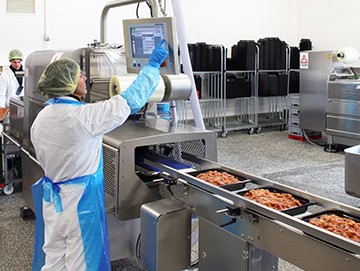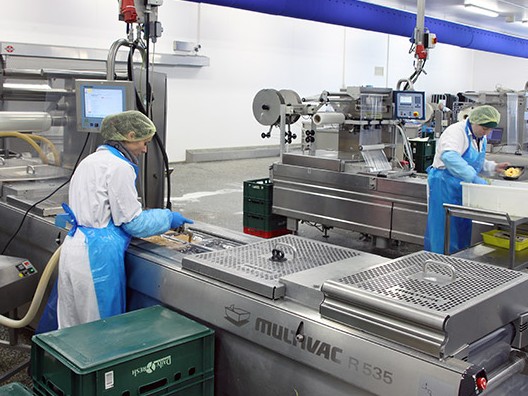
Daily Fresh Food is focused on quality, even when purchasing packaging machines. They come from Multivac. “We did try a cheaper-brand machine once,” says Marcel Devilee, director at Daily Fresh Food. “But we soon reconsidered.”
Daily Fresh Food produces high-quality meal components to order for contract caterers and food-service companies. The firm works with small batches, so flexibility is important. “That’s why we are so enthusiastic about the newest tray sealer from Multivac, the T700,” explains Marcel Bisselink, convenience manager at Daily Fresh Food. “That machine has a die change trolley which pre-heats the components. The employees simply place the trolley against the machine and can change the dies within five minutes. The machine no longer has to warm up first so sealing can start immediately.”
Daily Fresh Food has been working with Multivac machines for many years, and now has eight thermoformers and five tray sealers. “Above all, Multivac is a brand that you can trust,” says director Marcel Devilee. “With the cheaper-brand machine that we bought that time, the sealed seams were poor and we regularly had problems. The operators literally begged me to buy another Multivac instead. The Multivac machines are very reliable, and the engineers always arrive quickly if there are any problems. We’ve also signed a contract for preventive maintenance. That costs a bit more, of course, but it also means that we can extend the useful life of the machine so I see that as a very worthwhile investment.”
‘The nutritional value is preserved’
Marcel Devilee shows us around his company. Lobsters are crawling around in large, sheltered water tanks, and dry-aged meat is hanging up to cure in a special cold room. “Quality is our top priority,” he explains. “That’s why we produce many of our ingredients ourselves. We even have our own farm with 450 cows, so we have a firm grasp on the quality.”

Daily Fresh Food packages the meal components raw, and they are then slowly heated at a relatively low temperature. “The long heating time ensures a low aerobic colony count which extends the product shelf life,” continues Bisselink. “But most importantly of all, the nutritional value is preserved. The products maintain their texture, and loss of vitamins and minerals is minimised.” The meals are served in hospitals, care homes and restaurants. “Chefs no longer have time to cook meat for 5 to 7 hours,” says Devilee, “so we do it for them. The spare ribs are a good example. Chefs bake them briefly in the oven to produce a crispy finish. Plenty of restaurants have built their reputation on these kinds of products.”
Source: Multivac